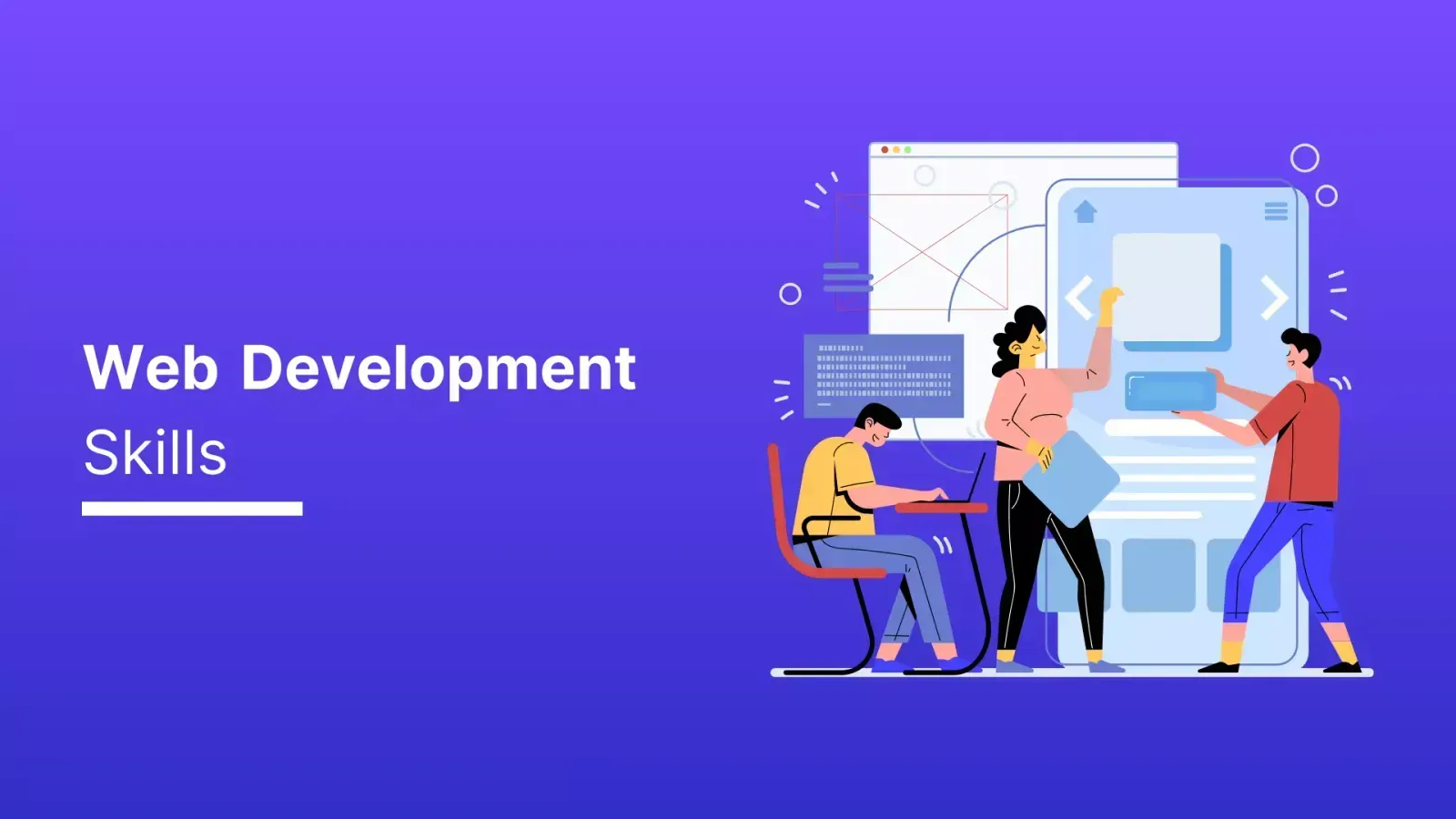Key Website Development Skills Every Developer Should Master in 2025
Website development is a rapidly evolving field that requires a combination of technical expertise, creativity, and problem-solving abilities. Whether you’re just starting or looking to enhance your current skills, knowing which website development skills are in demand is essential for building successful websites and web applications. This blog will explore the top website development skills that every developer should master in 2025.
Introduction
Website development is one of the most in-demand skills in today’s digital landscape. A career in web development offers a wide variety of job opportunities and the chance to work on exciting projects, from simple websites to complex web applications. To be successful, web developers must possess a diverse skill set that includes technical knowledge, creativity, and strong problem-solving abilities.
In this guide, we will explore the essential website development skills you need to thrive in the field, including both technical and soft skills.

1. HTML/CSS: The Building Blocks of Web Development
HTML (HyperText Markup Language) and CSS (Cascading Style Sheets) are the foundation of all websites. Every developer needs to have a strong understanding of these languages to create well-structured, responsive, and accessible websites.
- HTML: HTML is the backbone of web content. It defines the structure of a webpage using various tags and elements, such as headings, paragraphs, images, and links.
- CSS: CSS is used for styling the webpage. It defines the layout, colors, fonts, and overall design of the site.
Key Concepts to Learn:
- HTML tags and attributes
- CSS layout techniques (Flexbox, CSS Grid)
- Media queries for responsive design
- Browser compatibility
Mastering HTML and CSS is crucial for all web developers, as these skills are used in every project, no matter how complex.
2. JavaScript: Bringing Websites to Life
JavaScript is the scripting language that adds interactivity to websites. It is essential for creating dynamic, user-friendly websites with features like forms, animations, and real-time content updates. JavaScript can be used both on the client-side (front-end) and server-side (back-end).
Key Concepts to Learn:
- DOM manipulation and event handling
- Asynchronous programming (Promises, async/await)
- JavaScript libraries and frameworks (React, Angular, Vue.js)
- Data structures and algorithms in JavaScript
Learning JavaScript allows developers to create interactive, dynamic web applications that provide seamless user experiences.
3. Front-End Frameworks and Libraries
To streamline front-end development and improve productivity, many developers use front-end frameworks and libraries. These tools make it easier to build modern, scalable web applications.
- React: A JavaScript library for building user interfaces, particularly single-page applications (SPAs).
- Angular: A robust JavaScript framework that provides a full front-end development solution, including two-way data binding and dependency injection.
- Vue.js: A lightweight, flexible JavaScript framework that focuses on simplicity and ease of integration with other projects.
Key Concepts to Learn:
- Components and props in React
- Two-way data binding in Angular
- Directives and Vue.js features
Mastering a front-end framework is essential for building modern, efficient, and dynamic web applications.
4. Back-End Development Skills
Back-end development focuses on the server-side of a website or web application. It involves dealing with databases, server-side scripting, and API development. A strong back-end developer should understand how to build scalable and secure server applications.
Key Concepts to Learn:
- Server-side languages: Python, PHP, Ruby, Node.js
- Databases: SQL (MySQL, PostgreSQL) and NoSQL (MongoDB)
- RESTful APIs and GraphQL
- Authentication and authorization (OAuth, JWT)
Back-end developers are responsible for handling the logic and database interactions that power dynamic websites and web applications.
5. Version Control Systems (Git)
Version control is a must-have skill for every web developer. Git allows developers to track changes in their code, collaborate with other developers, and manage multiple versions of a project. It is essential for working on team-based projects and maintaining code integrity.
Key Concepts to Learn:
- Git commands (clone, commit, push, pull)
- Branching and merging
- Collaborating on platforms like GitHub and GitLab
- Version control best practices
Understanding Git is essential for collaboration and managing codebases efficiently.
6. Responsive Design and Mobile Optimization
In today’s world, it’s crucial for websites to be responsive, meaning they should work well on all screen sizes—from desktops to smartphones. Responsive design ensures that users have a smooth experience, no matter how they access the site.
Key Concepts to Learn:
- Fluid grids and flexible layouts
- Mobile-first design principles
- Media queries in CSS
- Viewport meta tags and mobile optimization
Responsive web design skills ensure that websites are accessible, user-friendly, and optimized for mobile devices.
7. Web Performance Optimization
Website performance directly impacts user experience and search engine rankings. A fast-loading website leads to higher engagement and lower bounce rates. Web performance optimization involves improving website speed and efficiency by reducing load times.
Key Concepts to Learn:
- Image optimization and lazy loading
- Minification of CSS, JavaScript, and HTML
- Caching strategies
- Content Delivery Networks (CDNs)
Learning how to optimize web performance is crucial for creating fast, scalable, and user-friendly websites.
8. Web Security Skills
Web security is one of the most critical aspects of website development. A secure website protects users’ data, prevents malicious attacks, and ensures a safe user experience. Developers must be aware of common vulnerabilities and best practices to keep their websites secure.
Key Concepts to Learn:
- HTTPS and SSL/TLS encryption
- Preventing Cross-Site Scripting (XSS) and Cross-Site Request Forgery (CSRF)
- SQL injection prevention
- Secure password storage (hashing and salting)
Security is an essential skill for developers to ensure their websites are protected from potential threats.
9. Search Engine Optimization (SEO)
SEO is the practice of optimizing a website to rank higher in search engine results. As a website developer, it’s important to understand SEO principles to ensure that the websites you build are search engine-friendly.
Key Concepts to Learn:
- On-page SEO (meta tags, headings, keyword optimization)
- Structured data and schema markup
- URL optimization and internal linking
- Mobile optimization for SEO
A strong understanding of SEO helps increase the visibility and accessibility of websites in search engines, driving organic traffic.
10. Soft Skills for Website Development
In addition to technical skills, website developers must possess soft skills to communicate effectively and collaborate with clients, teams, and stakeholders.
Key Skills:
- Problem-solving: Addressing challenges with creative solutions.
- Communication: Clearly conveying ideas, collaborating, and explaining technical concepts to non-technical stakeholders.
- Attention to Detail: Ensuring quality code and error-free websites.
- Time Management: Meeting deadlines and managing projects effectively.
Soft skills are critical for working efficiently within teams and meeting client expectations.
Conclusion
Website development requires a combination of technical expertise and creative thinking. Whether you’re a beginner or an experienced developer, mastering these essential skills will help you create functional, responsive, and engaging websites. As the field continues to evolve, staying updated with new technologies, frameworks, and best practices is key to maintaining a successful career in web development.
For More Information: Cash Flare Digital
FAQs
- What are the most important skills for a website developer? HTML, CSS, JavaScript, front-end and back-end development, Git, responsive design, SEO, and web security are essential skills for web developers.
- How long does it take to learn website development? It can take anywhere from a few months to a year, depending on your pace and the depth of learning required.
- Do I need to learn both front-end and back-end development? While you can specialize in one area, full-stack development (front-end and back-end) makes you more versatile and employable.
- What are the best tools for website development? Tools like Visual Studio Code, Git, Figma, and frameworks like React, Angular, and Node.js are commonly used in web development.
- What is responsive design? Responsive design ensures that a website adapts its layout and content based on the user’s screen size, offering a seamless experience on all devices.
- Why is SEO important for web developers? SEO helps websites rank higher in search engine results, increasing traffic and visibility.
- Can I learn website development online? Yes, there are many online platforms, such as Udemy, freeCodeCamp, and Coursera, that offer courses for learning web development.
- What is the role of web security in website development? Web security protects websites from threats, ensuring user data is secure and preventing cyberattacks.
- How can I improve my website development skills? Practice building projects, contribute to open-source, stay updated with industry trends, and take online courses.
- What is the future of website development? The future of website development involves advancements in AI, machine learning, mobile optimization, and the continued evolution of web frameworks.
